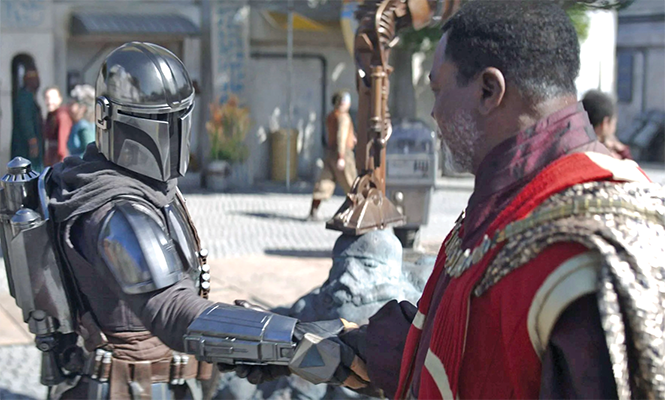
- Lucasfilm
When we talk about stories that run on television, one thing we hear a lot about lately is whether or not the showrunners stick the landing of the end, like they're Simone Biles performing her Olympic floor exercise. Endings are important to stories—but the journey is important, too.
Recently, a reporter from Total Film asked Jon Favreau, the man behind Star Wars: The Mandalorian, about whether or not he and co-creator Dave Filoni are building to an ending on that show—and he was up front that they weren't. "I think the beauty of this," he told them, "is that it's a middle chapter of a much larger story. And though we'll have resolution over time with these characters, I think that's how these characters fit into the larger scope and scale, but it's not like there's a finale we're building to that I have in mind. Quite the contrary, I love for these stories to go on and on. And so these characters potentially could be with us for a while, and I really love telling stories in their voice, and I love the way the adventures unfold and I'm looking forward to doing much more."
And really, who can argue with such enthusiasm? Why does there need to be a destination in mind? When the show comes to an end, they should be more than able to craft one that feels satisfying. But sometimes those middle chapters can feel equally satisfying, because that's the nature of serialized storytelling. With hindsight, would anyone complain about the ending of The Empire Strikes Back lacking satisfaction? George Lucas had only a vague idea of how Return of the Jedi might end at that point, but we got one of the most thrilling endings ever put to film despite that lack of planning.
Do you have to have a TV series building to a specific ending? Plenty of TV shows we hail as classics didn't. In fact, this idea of "ending" a show feels relatively new.
That's why I still love Lost so much. I think the ending to Lost was fine; I believe the most vocal opponents of it didn't pay close enough attention to it. But the real excitement of Lost was the journey we took week-to-week in the storytelling, season after season unravelling the mysteries. Whatever the eventual solution to those mysteries were, it did not in any way diminish the enjoyment I had watching the show as it aired in the first place. Many were incensed that the creative team didn't have an ending in mind when they started. Others felt cheated.
I wonder sometimes, though, if we get too hung up on the meaning of the ending, rather than the meaning we derive from the journey. Kurt Vonnegut once wrote in his book Breakfast of Champions that "the proper ending for any story about people it seems to me, since life is now a polymer in which the Earth is wrapped so tightly, should be the same abbreviation, which I now write large because I feel like it, which is this one: ETC."
Some of the best stories end with that big etcetera, and that's not a bad thing. When we look at The Mandalorian, it's important to ask why we'd even be hung up on an ending. As the story has unfolded across its seasons, and in spinoffs like The Book of Boba Fett, we've been given plenty of satisfying endings, both in individual episodes and at the ends of the seasons. We've been able to derive meaning and enjoyment every step of the way.
So how could an ending—or a lack of one, or one that somehow missteps—take any of that away from us as we look back on the lessons we've already learned from the show, or the in-the-moment pleasures we experienced?
Besides, I'm enjoying the show so much, I don't want it to end either. Why would I enforce an artificial timeline or horizon on someone like Jon Favreau, who is bringing so much cool stuff to a universe I love, just because I need a so-called "ending?"
Roger Ebert once said that movies (and I think he'd agree television counts, too) are machines for generating empathy. That's what they're supposed to do: show us things about ourselves and the world around us. An ongoing, serialized story doesn't need one final, definitive ending to do that. It has a different one every week, leaving us an opportunity to learn lots of lessons, and leave us after each installment with that feeling of "etcetera" that Vonnegut talked about.
Really, a TV show with no ends in sight is the best of both worlds—and I'm okay with that.